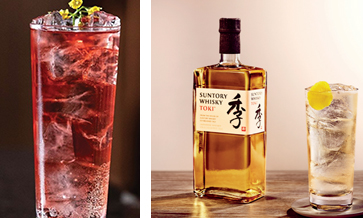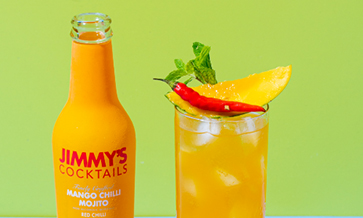The use of fruit in beer is nothing new: just think of the fruited lambics of Belgium, or the tart Berliner Weisse of Germany. But in today’s ‘anything goes’ brewing landscape, the use of beer in fruit is seeing a resurgence as brewers around the world experiment with styles and flavours, both ancient and experimental.
Renowned for their innovation and creativity, American craft brewers are pushing the boundaries of brewing with fruit to develop ground-breaking new styles, tastes and flavours. 903 Brewing Co. from Sherman (Texas) releases four new heavily-fruited sour beers per month based on fruits that are in season.
Jeremy Roberts, the co-owner/founder of the brewery, claims that the trend towards fruited beers is growing and explains: “We’re seeing more and more consumers getting burned out on beer. Ready-to-drink cocktails are a growing trend that people are increasingly drinking instead of beer.”
Getting people excited about beer again is not easy, but heavily fruited sours and sours that taste like cocktails appeal to the non-beer drinkers and to those who are looking for more flavour, he adds.
It’s not only the youth of today who are enjoying such beers. Roberts continues: “We guessed that our heavily fruited sours would be just for the young drinkers, but that’s not the case. While hanging out in the taproom you will find people both in their 20s and 70s enjoying our heavily fruited sours!”
Main challenges
However, brewing with fruit has its challenges. Using real fruit can risk the chance of infection by wild yeasts on the fruit skins. Some brewers may boil the fruit first to reduce potential infection, but it can also burn off subtle flavours and aromas.
Brewing with fresh fruit is expensive and availability of certain fruits is never certain. Yields and quality can be inconsistent because fruit contains large concentrations of water and will dilute the beer. But for any brewer getting it right, the rewards can be well worth it!
Fruit purees are easier to work with, but should be 100% fruit and aseptically packaged. They are pasteurised, thus eliminating the risk of infection while maintaining the flavour integrity of the fruit, and contain no added flavouring, preservatives or colouring.
Extracts also have a part to play, and many are derived from natural sources. They can do wonders for boosting natural fruit flavours post fermentation. Frozen fruit, dehydrated fruit, fruit powder, concentrate and freeze-dried fruits are other products available to brewers for use in beer.
Fruit can be added to almost any style of beer but is most commonly used in low-hopped wheat or blonde ales, Berliner Weisse and sour beers, hazy/juicy IPAs, barrel-aged beers and even pastry stouts.
Fruit can work with a broad spectrum of alcohol strengths and still provides sweetness that can be balanced by a high level of acidity.
Where and when fruit is added in the brewing process, it will impact the character of the finished beer – it will allow the yeast to convert sugars into alcohol and bio-transform unique fruity esters and flavours even before the fermentation, or after fermentation to prevent the sugars from fermenting out.
The latter will leave the final product sweeter by maintaining the subtle fresh fruit flavours.
Creative juices
Brewing with fruit opens up a world of creativity. Urban Artifact, a brewery in Cincinnati (Ohio) is the USA’s largest only ‘sour’ brewery and uses more fruit than any other brewery in the country: over a million pounds of puree per year!
Bret Kollmann Baker, COO and Brewmaster of Urban Artifact explains: “We were established in 2015, and the first couple of years were rough. We knew that tart and fruited beers were going to be a major thing but didn’t know it would take a couple of years to break down wrong perceptions about fruit beer being for ‘women’ or tart beer being ‘spoiled’.
“Now the stigma associated with fruit beer is fading and people are craving for flavour and choice. We tend to skew to a slightly younger audience and have found great success with those that are open to new experiences, ideas, flavours and great tasting liquids.”
Bret is extremely proud of how Urban Artifact’s drinking demo skews almost 50:50 (male: female), where the ‘normal’ US craft brewery sees a customer base that is closer to 70:30.
Many flavour compounds that exist in fruit also exist in hops, citrus being the best example. An IPA brewed with citrusy Centennial hops may benefit from the addition of lemon zest to the finished beer to emphasise the centennial hop characteristics.
Alternatively, a small addition of passionfruit puree to a beer brewed with tropical flavoured hops such as Mosaic or Simcoe may help to amplify the tropical notes of the beer.
A US brewery producing both IPAs (without the addition of fruit) and sour fruited beers is Destihl Brewery located in Normal (Illinois). It was one of the first breweries in the US to package sours in cans, which was industry-changing since most sours before then were bottled, often with cork and cage, and expensive.
One of their best-selling single beers is blonde ale, Hawaii Five Ale, which uses five different fruit purees: coconut, mango, peach, pineapple and pink guava. Destihl’s fruited sours appeal to both men and women, old and young.
As consumer tastes evolve and brewers continue to innovate, even greater experimentations are expected in future years to keep American craft brewing firmly at the forefront of global brewing creativity.














